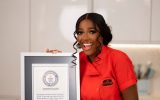It’s really hard to tell if Forbes Magazine’s infamous annual evaluation of the most bankable artists in Africa still has the same relevance it used to. A few years ago, a roll-out of all the biggest artists worth an investment on the continent would have sparked social media conversation and industry chatter about the state of the African soundscape. This year however, Forbes’ list seems to have sailed under the radar.
Agreeably, the value of a co-sign from Forbes is still quite valid for elitist Western acceptance and brand appeal for those who were drafted, but what does it really say about the progression of African music as a whole?
There are two ways to answer this question.
The first is to assume that African music and its firebrands still need their impact on the continent to be validated by a ‘reputable’ international publication. The other way is to assume that modern African music playmakers are actually invested in ego tussles based on evaluation using vague criteria like: awards (from events that have been increasingly boycotted over the years), appearances in newspapers (nobody young and passionate about music reads anymore), un-trackable sales, un-audited performance fees, and social media numbers we all know are fake and bought.
The joke of Forbes’ listicle is even funnier when you realise, Akon, Tinashe and Jidenna seem to have gotten placement by default, simply because they are of African descent. This is against the backdrop of the actual reality that except for Akon, their affiliation with the African soundscape didn’t happen until very recently, thanks to the sudden global acclaim for Afropop and Afro-Carribean music. I admit, it may be a tough stretch to say that Forbes only included them for universal touch. But considering Akon is making less music and doing more charity these days, and both Jidenna and Tinashe are mid-level artists in their primary American markets, we should all be collectively infuriated to find them on the same ranking alongside some of Africa’s biggest exports, including two time Grammy winner Hugh Masekela.
Perhaps in the future, a Forbes listicle we can all take seriously will be one with actual figures readers can see and quite possibly verify. In reality however, its 2017 and some of the most successful younger artists from the last twelve months (Chance The Rapper, Frank Ocean et al) have abandoned the numbers game altogether, owing their successes to digital streaming and live shows instead. In a couple of years what it means for an artist to be ‘bankable’ will no longer be limited to mere psuedo-economic buzz words that belong in a boardroom but also how artists creatively evolve sustainable brands without industry politicking. Until then, we should all create a folder in our recycle bins for this and all future versions of Forbes’ list of most bankable African artists.














